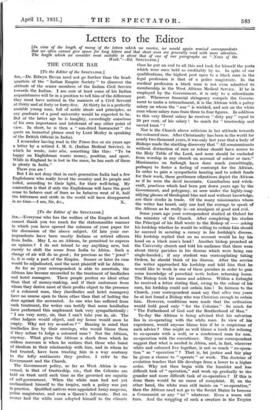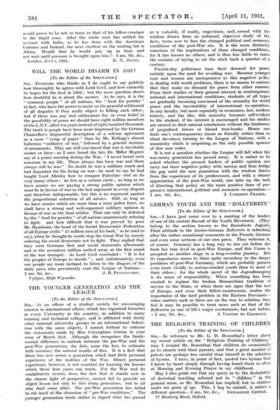I To the Editor of the SPECTATOR.] SIR,—Everyone who has
the welfare of the Empire at heart cannot thank you too much for the statesmanlike manner in which you have opened the columns of your paper for the discussion of the above subject. Of late your cor- respondents have been mostly Indians or retired officers from India. May I, as an African, be permitted to express an opinion ? I do not intend to say anything new, but merely to shift the scene from India to Africa. Such a change of air will do us good ; for precious as the " jewel " is, it is only a part of the Empire. Sooner or later its case would be adjudicated, and the next plaintiff will be Africa.
So far as your correspondent is able to ascertain, the African has become reconciled to the treatment of landladies and hotel managers. These people profess no ideal other than that of money-making, and if their customers from whom they derive most of their profits object to the presence of a coloured man, they (landladies and hotel managers) have no course open to them other than that of bolting the door against the unwanted. As one who has suffered from such treatment, the writer can testify that some landladies have performed this unpleasant task very sympathetically : " I am very sorry, sir, that I can't take you in, sir. The other lodgers would object, and my house would soon be empty. Why not try so-and-so ? " Bearing in mind that landladies live by their earnings, who would blame them if they refuse to lodge a coloured man ? Not the African, anyway. What gives the African a shock from which he seldom recovers is when he realizes that those who boast of idealism in their relationship with him, and in whom he had trusted, have been treating him in a way contrary to the lofty sentiments they profess. I refer to the Government and the Church.
The Government policy, so far as West Africa is con- cerned, is that of trusteeship, viz., that the Colonies are held on trust until such time as the governed are capable of self-government. When the white man had not yet acclimatized himself to the tropics, such a policy was put in practice. Qualified natives were appointed Army surgeons, Police magistrates, and even a Queen's Advocate. But no sooner had the white man adapted himself to the climate than he put an end to all this and took for himself the posts which were once held so creditably by us. In spite of our qualifications, the highest post open to a black man in the legal profession is that of a police magistrate. In the medical profession a black man is not even admitted to membership in the West African Medical Service. If he is employed by the Government, it is only to a subordinate post. Whenever financial stringency compels the Govern- ment to make a retrenchment, it is the African with a paltry salary on whom the " axe " is wielded, and not on the white man whose salary runs from three to four figures. In addition to this very liberal salary he receives " duty pay " equal to 20 per cent. of his salary So much for " trusteeship and sacred trust " I
Nor is the Church above criticism in her attitude towards the coloured race. After Christianity has been in the world for nearly two thousand years, it was only last year that a body of Bishops made the startling discovery that " All communicants without distinction of race or colour should have access to the Holy Table of the Lord, and none should be excluded from worship in any church on account of colour or race." Missionaries on furlough have done much (unwittingly, perhaps) to foster a feeling of contempt for the. African. In order to gain a sympathetic hearing and to solicit funds for their work, these gentlemen oftentimes depict the African as if he were the devil incarnate. Cannibalism and witch- craft, practices which had been put down years ago by the Government, and polygamy, as seen under the highly-mag- nifying glasses of theological bias and zeal without knowledge, are their stocks in trade. Of the many missionaries whom the writer has heard, only one• had the courage to speak of the African as he really is—an amalgam of good and evil.
Some:years ago your correspondent studied at Oxford for the ministry of the Church. After completing his studies the Principal of his Hall wrote to the Bishop of — asking his lordship whether he would-be willing to ordain him should he succeed in securing a curacy in his lordship's diocese. His lordship replied that on no account would he lay his hand on a black man's head ! Another bishop preached at the University church and told his audience that there were about thirty parishes in his diocese which were being run single-handed ; if any student was contemplating taking Orders, he should think of his diocese. After the service the writer approached his lordship and told him that he would like to work in one of these parishes in order to gain some knowledge of parochial work before returning home. The Bishop took his name and address. Within a fortnight he received a letter stating that, owing to the colour of his race, his lordship could not ordain him ! In fairness to the Church, your correspondent must say that after two years he at last found a Bishop who was Christian enough to ordain him. However, conditions were made that the ordination would hold good only " for the Colonies." So much for " The Fatherhood of God and the Brotherhood of Man."
To-day the African is being advised that his salvation lies in co-operating with the white man. In view of his experience, would anyone blame him if he is suspicious of such advice ? One might as well blame a lamb for refusing to co-operate with a wolf, or a condemned man for non- co-operation with the executioner. May your correspondent suggest that what is needed in Africa, and, in fact, wherever white and coloured live together, is not so much " co-opera- tion " as " operation " ? That is, let justice and fair play be given a chance to " operate " or work. The doctrine of evolution teaches that life develops from a lower to a higher order. Why not then begin with the humbler and less difficult task of " operation," and work up gradually to the grander and more difficult• task of co-operation ? If this is done there would -be no cause of complaint. If, on the other hand, the white man still insists on " eo-operation," then the African need not go to the Soviet States to become a Communist or any " ist " whatever. Even- a worm will turn. And the wriggling of such a creature in the Tropics would prove to be not so tame as that of his fellow-creature in the frigid zone. After the white man has settled his account with India, as he has done with the American Colonies and Ireland, the next creditor on the waiting list is Africa. Would that he would pay up in time and not wait until pressure is brought upon him !—I am, Sir, &c.,











































 Previous page
Previous page